Whether General Pervez Musharraf’s régime was beneficial to Pakistan or was it tantamount to destruction of the democratic process, whether or not he was a good dictator; it is all a debatable matter.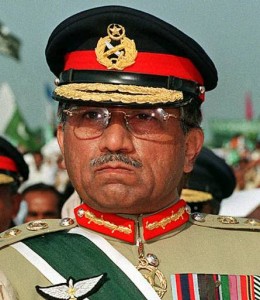 He, for the first time in Pakistani history, is going to trial for the heinous crime of High Treason.
He, for the first time in Pakistani history, is going to trial for the heinous crime of High Treason.
Pakistani history is marred with the military’s interference in Politics, so much so that out of 12 holders of the office of the President, 4 were serving Generals of the Pakistan Army, who came to power as a result of a coup d’état, overthrowing a legitimately elected government. Even the inaugural holder of the office of the President of Pakistan was a retired army General.
The takeovers were prohibited under the Constitution of Pakistan, and so these Generals, excising their military might, not legal authority, to suspend or hold in abeyance the Constitution of Pakistan, make amendments to it in attempts to legitimize their rule. This act, as defined in the constitution, is an act of High Treason.
Article 6 of the Constitution of the Islamic Republic of Pakistan states:
6. High Treason
(1) Any person who abrogates or subverts or suspends or holds in abeyance, or attempts or conspires to abrogate or subvert or suspend or hold in abeyance, the Constitution by use of force or show of force or by any other unconstitutional means shall be guilty of high treason.
(2) Any person aiding or abetting or collaborating the acts mentioned in clause (1) shall likewise be guilty of high treason.
(2A) An act of high treason mentioned in clause (1) or clause (2) shall not be validated by any court including the Supreme Court and a High Court.
(3) Majlis-e-Shoora (Parliament) shall by law provide for the punishment of persons found guilty of high treason.
From the words of the constitution, it is quite apparent that not just Musharraf, but all these Generals committed an act of High Treason by abrogating and subverting the constitution; Musharraf did this twice. The punishment for high treason as mentioned by Article 6 clause (3) of the constitution was provided by the Parliament a month after the constitution itself was enacted, under the short, 3 Section long, High Treason (Punishment) Act, 1973 (LXVIII OF 1973). Section (2) of this Act states:
2. Punishment for high treason, etc.:
A person who is found guilty
(a) of having committed an act of abrogation or subversion of a constitution in force in Pakistan at any time since the twenty‑third day of March, 1956; or
(b) of high treason as defined in Article 6 of the Constitution,
shall be punishable with death or imprisonment for life.
Life imprisonment or death: High treason is a serious crime. It is perhaps the gravest of offences. Why then, one may wonder, Yahya Khan and Ayub Khan walk away without ever being reprimanded for their crimes against Pakistan? And what took it so long for the trial of Musharraf to commence after he had stepped down?
The answer is: The Pakistan Army is really really strong. These men took power when they were serving as the Army’s Chief of Staff, and used their position of power to command the Army to do their biddings. The Army protects its servicemen even after their retirement, and so Musharraf had a cover. Musharraf resigned in 2008 after the new parliament took office after the 2008 General Elections, and expressed its intentions to impeach him. The day he announced his intentions to leave office by stating that he had tendered his resignation to the Speaker of the National Assembly as under law, the man, in face of impeachment by the Parliament, was given a guard of honor by the Army before he left for the United Kingdom to seek refuge from the cases against him since his Presidential immunity lapsed upon resignation.
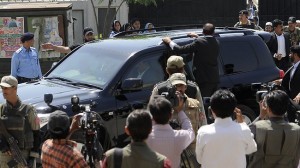
He spent about 5 years in self exile, and returned when his daughter was able to secure Protective Bail for him from the Sindh High Court; there were arrest warrants pending against him. He came during the time of elections when a caretaker Government was in office for the purpose of the conduct of the 2013 General Elections. When the Islamabad High Court had canceled his bail in a case, his security staff, comprising of military and paramilitary personnel, escorted him away from the court room even though the Police officials in the court room were ordered to arrest him.
When he finally surrendered, his farmhouse (a mansion) was converted to a sub-jail, probably to cut costs on providing him protection: he has angered many people by his constitutional and unconstitutional moves while holding the office of the President. This was the first time, a former army General was arrested, that too the former Chief of Staff.
Musharraf was arrested in multiple cases: Assassination of Former Prime Minister Benazir Bhutto, Murder of Former Balochistan Governor and Chief Minister Nawab Akbar Khan Bhugti, the Lal Masjid Operation and Judges’ Detention Case.
The last of these cases occurred when Musharraf proclaimed a state of emergency and suspended the Constitution of Pakistan for a second time. It is pertinent to mention that he is the first of all military rulers in Pakistan to suspend the Constitution twice.
The Supreme Court, on a petition, asked the Attorney General for the Government’s response upon prosecution of Musharraf for High Treason. The Caretaker government responded that it was not its mandate to take a decision on the matter, and that the same should be decided by the upcoming government. The Senate in the meanwhile, and previously too, passed resolutions calling upon prosecution of Musharraf for High Treason.
The government of Nawaz Sharif, formed after the 2013 General Elections, within weeks of taking office through the Interior Minister Chaudhry Nisar Ali Khan expressed the government’s intentions to prosecute him. They wrote a vague letter to the Supreme Court stating the same, however it lacked instructions of commencing the trial.
It took five months, a sectarian violence in Muharram’s Ashura in Rawalpindi and a curfew in the Capital’s twin city, for Nisar Ali Khan the Interior Minister to announce at a hurriedly called press conference that the Government would be writing to the Supreme Court to form a Special Court under law for the High Treason trial. The announcement was described as a move by many to divert attention from the violence and curfew. True or not, the government through the Interior Secretary, wrote to the Chief Justice of Pakistan, with instructions to constitute a Special Court under the law for the purpose of the trial.
The Chief Justice in turn wrote to the Chief Justices of the 5 High Courts, requesting nominations of judges for the Special Court. Out of all the received nominations the Chief Justice had to select 3 judges for the full bench. Perhaps in order to avoid controversy, Justice Iftikhar Muhammad Chaudhry, the Chief Justice, forwarded the nominations to the Prime Minister for final selection, and three judges, one each from Balochistan, Sindh and Punjab were chosen to hear the trial. Justice Faisal Arab of Sindh, being the senior most, will head the trial.
Meanwhile a Musharraf’s North America based spokesman lashed out at the government for the move, criticizing it as “undermining Pakistani Military”. He might have forgotten that Musharraf lead the Pakistani Military into an unauthorized warfare against India in the Kargil War from May – July 1999, humiliating Pakistan in front of the world.
Under law, the Special Court enjoys exclusive jurisdiction to hear the treason trial, and no other court, including the Supreme Court can interfere or intervene in its matters and proceedings.
The investigation in this case isn’t complete, and a member of the 4 man investigation committee said:
We would then be in a position to get warrants or directions from the special court for summoning the people who have evidence but were not cooperating at the earlier stage of investigation.
The army might not save his skin this time. A current serving officer of the Pakistan Army, stating that what he was about to say would be his own views not the Army’s since he is bound by the law, to not to make official remarks, while explaining the army’s current stance, more specifically on the War on Terror personally told me:
The Military’s internal policy has changed. It is no longer what it was during the time of Zia-ul-Haq and Musharraf, yes I was in the army during those times. It is no longer like that, and I wouldn’t discuss that; currently the Army has just one mindset: we are subordinate to the Civilian Government. If we are ordered to fight, we will fight, if we are ordered to stop fighting, we will stop, no questions asked.
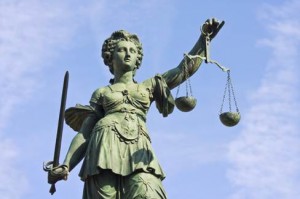 Is this trial too little too late, or just not relevant to the interests of Pakistan. Over the last few years, both Turkey and Bangladesh tried and sentenced to death their former military dictators and their abettors. Would Pakistan follow suit? Musharraf’s trial is not just about him, it is about the Rule of Law over any individual in Pakistan. If Musharraf is punished for his crimes against Pakistan, this would serve as a deterrent to future military ambitionists who aim to usurp powers like those before them. This should be done for Pakistan to evolve as a democratic state where the law is above all; it would officially mark a new chapter in Pakistani history, where the armed forces would be what they should have been: subordinate to the government of the people.
Is this trial too little too late, or just not relevant to the interests of Pakistan. Over the last few years, both Turkey and Bangladesh tried and sentenced to death their former military dictators and their abettors. Would Pakistan follow suit? Musharraf’s trial is not just about him, it is about the Rule of Law over any individual in Pakistan. If Musharraf is punished for his crimes against Pakistan, this would serve as a deterrent to future military ambitionists who aim to usurp powers like those before them. This should be done for Pakistan to evolve as a democratic state where the law is above all; it would officially mark a new chapter in Pakistani history, where the armed forces would be what they should have been: subordinate to the government of the people.
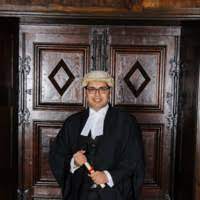
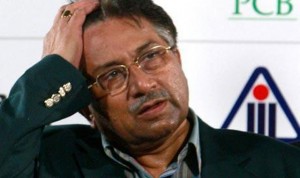
Leave a Reply